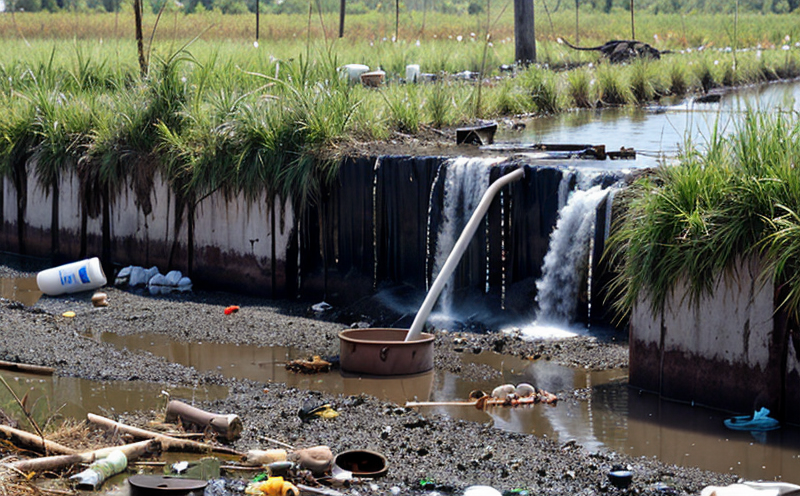Biodiesel Pollutant Testing
In today's environmentally conscious world, biodiesel is gaining significant traction as a renewable fuel alternative to traditional petroleum-based diesel. However, despite its ecological benefits, biodiesel can still contain pollutants that need thorough testing and analysis for compliance with international standards and regulations.
The process of biodiesel pollutant testing involves identifying and quantifying various contaminants present in the biodiesel sample, including but not limited to: sulfur content, total oxygen content, trace metals (such as copper, iron, and zinc), and any impurities that could affect engine performance or contribute to emissions. This service is crucial for ensuring the quality of biodiesel meets both environmental protection requirements and customer expectations.
At Eurolab, our advanced laboratory facilities are equipped with state-of-the-art analytical instruments designed specifically for biodiesel pollutant testing. Our team of experts employs rigorous methodologies aligned with international standards like ISO 14530:2017, ASTM D6751, and EN 14541 to deliver accurate and reliable test results.
One key aspect of our biodiesel pollutant testing service is the use of a comprehensive analytical approach that goes beyond mere compliance checks. By understanding the specific needs of our clients—be they quality managers, compliance officers, R&D engineers, or procurement professionals—we ensure every test is tailored to address their unique requirements.
Our testing covers not only the chemical composition but also the potential environmental impact of biodiesel. This includes assessing how pollutants in biodiesel might contribute to air pollution and other ecological concerns. With this information, stakeholders can make informed decisions about fuel selection and usage that balance performance with sustainability goals.
| Parameter | Methodology | Target Range (mg/kg) |
|---|---|---|
| Sulfur Content | Flame Ionization Detection (FID) | <5 ppm |
| Total Oxygen Content | Infrared Spectroscopy | 10-20 wt% |
| Trace Metals: Copper, Iron, Zinc | Inductively Coupled Plasma Mass Spectrometry (ICP-MS) | <5 ppm |
| Sample Preparation Steps | Description |
|---|---|
| Filtration | Removal of particulate matter. |
| Dilution | To ensure accurate measurement within the instrument's range. |
| Cuvette Preparation | For optical absorption measurements. |
- Compliance Assurance: Ensures biodiesel meets regulatory requirements like ISO 14530:2017 and ASTM D6751.
- Performance Optimization: Identifies potential areas for improvement in fuel quality.
- Sustainability Assessment: Evaluates the environmental impact of pollutants present in biodiesel.
Our commitment to excellence extends beyond just meeting standards; it includes providing detailed reports that offer insights into how pollutant levels affect overall fuel performance and sustainability. This data can be invaluable for ongoing research and development efforts aimed at creating cleaner, more efficient biofuels.
Eurolab Advantages
At Eurolab, we pride ourselves on offering a range of advantages that set us apart in the field of biodiesel pollutant testing. Our comprehensive approach ensures accurate and reliable results every time, backed by years of experience and cutting-edge technology.
- Expertise: Our team comprises highly skilled professionals with deep knowledge of biodiesel chemistry and analysis.
- Comprehensive Testing: We cover not just compliance but also performance optimization and sustainability assessments.
- State-of-the-Art Facilities: Equipped with the latest instruments for precise measurements.
- Rigorous Quality Control: Every test undergoes multiple checks to ensure accuracy and consistency.
Our clients benefit from our commitment to excellence, which translates into better-informed decision-making regarding fuel choices. Whether you are a quality manager looking to maintain high standards or an R&D engineer pushing the boundaries of biofuel technology, Eurolab provides the necessary tools and expertise to support your goals.
Quality and Reliability Assurance
The importance of quality and reliability in biodiesel pollutant testing cannot be overstated. Inaccurate or unreliable results can lead to incorrect decisions that may compromise both environmental protection efforts and business operations. At Eurolab, we take stringent measures to ensure the highest standards are met.
- Calibration: Regular calibration of all analytical instruments ensures consistent and accurate measurements.
- Data Validation: Multiple checks are performed on each set of data collected during testing.
- Auditing: Internal audits ensure compliance with international standards and best practices.
We understand that trust in our services is paramount. That's why we maintain a rigorous quality management system certified to ISO 9001:2015, ensuring every aspect of our operations—from sample receipt to final report issuance—is conducted meticulously.
By choosing Eurolab for your biodiesel pollutant testing needs, you gain access to a network of experts dedicated to providing reliable and accurate results. This not only enhances the quality of your products or processes but also contributes positively towards environmental conservation objectives.
Use Cases and Application Examples
Biodiesel pollutant testing has numerous applications across various sectors, from automotive manufacturing to renewable energy production. Here are some practical examples illustrating how our services can be utilized:
| Application | Description |
|---|---|
| Vehicle Certification | Demonstrating compliance with emission standards. |
| R&D Optimization | Identifying potential improvements in fuel quality for enhanced performance. |
| Supply Chain Management | Ensuring consistent product quality throughout the supply chain. |
| Application | Description |
|---|---|
| Emission Control Programs | Assessing the impact of pollutants on air quality in urban areas. |
| Environmental Impact Assessments | Providing data for assessing the overall environmental footprint of biodiesel usage. |
| Biodiesel Blending Compliance | Ensuring blends meet specified pollutant limits set by regulatory bodies. |
- Vehicles: Demonstrating that the biodiesel used in vehicles meets emission standards.
- R&D: Optimizing fuel formulations to reduce pollutants and improve efficiency.
- Supply Chains: Ensuring consistent quality across all stages of production and distribution.
These applications highlight just a few ways our biodiesel pollutant testing service can add value. Whether you're part of the automotive industry or involved in renewable energy projects, our expertise ensures you have the necessary data to make informed decisions about your fuel choices.





